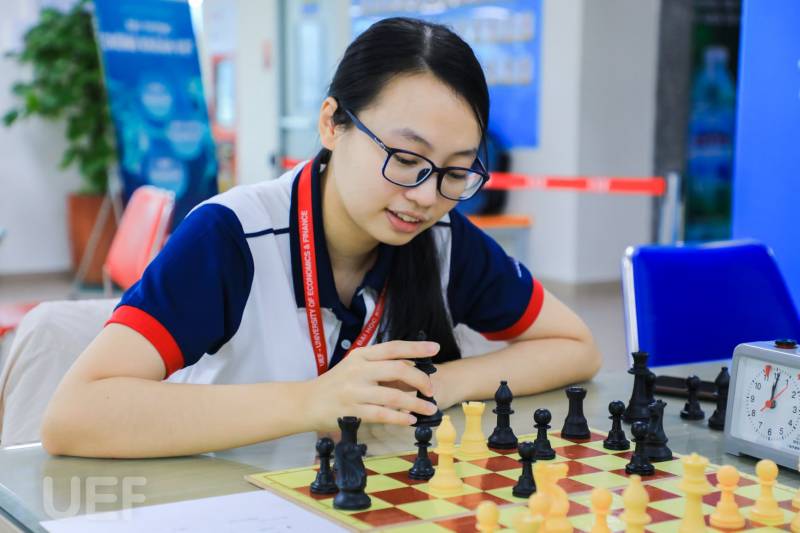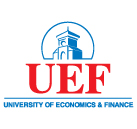Dear Freshmen of the 2025 Cohort,
Welcome to the University of Economics and Finance, Ho Chi Minh City (UEF). We are delighted to have you join our academic community. To help you prepare for your upcoming journey of study and self-development, this introduction will provide you with a clearer understanding of your chosen major and greater confidence as you begin this new chapter.
For many students, English is merely a means of communication. What can you actually do with a Bachelor’s degree in English Language? Are you wasting your time pursuing this major when you could simply attend language centers to improve your English skills or obtain international certificates? Do you have sufficient professional competence to compete in an increasingly demanding labor market? These are common concerns among students and parents when choosing this field of study. At UEF, the English Language program offers far more than training in the four basic language skills of listening, speaking, reading, and writing. The program opens a gateway to the fascinating worlds of linguistics, cultural studies, and social knowledge, while also providing specialized skills and professional expertise tailored to each sub-discipline. Graduates from our program are well-equipped with both linguistic proficiency and professional competence, enabling them to confidently enter the domestic and international job markets or pursue higher levels of academic study.
Who will you learn and work with?
The Faculty of English at UEF is proud to have a team of highly qualified and dedicated lecturers with extensive teaching experience. Many of our faculty members hold doctoral and master’s degrees from prestigious universities both in Vietnam and abroad. Over 95% of our lecturers have more than five years of experience teaching at the university level. What truly distinguishes the Faculty of English is the openness, enthusiasm, and commitment of our lecturers. They are not only passionate educators but also inspiring mentors who ignite in students a genuine love for learning. Beyond imparting academic knowledge, our lecturers strive to motivate students, nurture their curiosity, and provide support in both academic and personal matters. As your advisors and companions on your academic journey, they are always ready to share valuable insights, academic and professional experiences, and life lessons. With their guidance, you will find university life both enriching and dynamic, balancing effective study with meaningful personal growth.

Lecturers are always committed to accompanying students in their academic and professional development.
The lecturers of the Faculty of English at UEF constantly enhance their professional expertise and refine their teaching methodologies to deliver engaging and effective lessons. Their goal is to help students develop essential 21st-century skills, foster creativity and independence, and promote active participation through a wide range of in-class activities that cater to both individual needs and collective dynamics. Our lecturers consistently encourage students to strengthen their sense of teamwork, creative thinking, and critical problem-solving skills, as well as their abilities in discussion, negotiation, and examining issues from multiple perspectives. Classroom activities are designed not only to enhance student engagement and initiative but also to create opportunities for learners to contribute ideas, provide feedback, and collaborate with lecturers to further improve the quality and effectiveness of teaching and learning.
![]()
Students demonstrate confidence when delivering presentations to lecturers and their peers.
What will you study?
With the goal of optimizing training effectiveness and creating the most convenient learning experience for students, the English Language curriculum is designed with a logical structure that focuses on specialized knowledge and professional skills aligned with the needs of employers and the realities of various professional settings, including companies, agencies, and organizations. The program is both streamlined and comprehensive, ensuring that students acquire the essential theoretical knowledge and practical skills required to perform diverse professional tasks with confidence and competence. This is one of the key advantages for English Language students, as it not only helps them save time during their studies but also enhances their employability and career prospects after graduation.
English is the primary language of instruction.
The learning process is divided into two main phases as follows:
Phase 1: This stage focuses on enhancing students’ language proficiency through intensive training in the four core skills: listening, speaking, reading, and writing alongside sub-skills such as grammar, vocabulary, and pronunciation. A substantial amount of time is devoted to language practice to ensure that students achieve the level of English proficiency required by the university’s graduation standards, as well as for future academic and professional purposes.
Phase 2: In this stage, students can choose a specialization that aligns with their interests and future career orientation. The program offers four main specialized tracks, each with its own distinctive features.
|
Majors
|
Distinctive features
|
|
English Language Teaching
Some representative courses include:
1. Introduction to Linguistics
2. Introduction to Applied Linguistics
3. Language and Society
4. Intercultural Communication
5. English Language Teaching I
6. English Language Teaching II
|
A distinctive feature of the English Language Teaching specialization is in its emphasis on courses in teaching methodologies, lesson design, approaches to diverse learner groups, classroom management, and the application of linguistic knowledge to language instruction. In addition to theoretical foundations in pedagogy and linguistics, students are given multiple opportunities to engage in teaching practice sessions, receive guidance in lesson planning for various proficiency levels and materials, and develop skills in teaching both individual and integrated language skills. Courses such as Introduction to Linguistics and Introduction to Applied Linguistics equip students with a solid academic foundation, enabling them to effectively address and resolve issues that may arise during the teaching and learning process.
|
|
Business English
Some representative courses include:
1. Business Reading
2. Business Writing
3. Principles of Marketing
4. Organizational Behavior
5. International Business Management
6. Human Resource Management
|
After completing the foundational language skills courses - Listening, Speaking, Reading, and Business Writing - along with courses in linguistics, culture, and literature, students will study four specialized subjects in economics and commerce. This specialization not only enables students to further develop their English language proficiency but also equips them with essential business and trade knowledge. With their strong language competence, students are able to engage in independent study and research of international business and economic materials, keeping themselves informed of the latest global developments. This integration of linguistic competence and business knowledge constitutes a distinct advantage for Business English majors in today’s highly competitive labor market.
|
|
Translation and Interpreting
Some representative courses include:
1. Introduction to Linguistics
2. Translation
3. Semantics
4. Theory of Translation
5. Techniques in Interpreting
6. Translation, Linguistics, and Culture
|
The Translation and Interpreting major focuses on training professional translators and interpreters to meet the growing demands of a globalized society. After completing foundational courses in language skills and linguistics, students proceed to five specialized modules in translation and interpreting, including Theory of Translation, Translation (two modules), Techniques in Interpreting, and Translation, Linguistics and Culture. These modules, designed around a wide range of topics, not only help students enhance their translation and interpreting skills but also expand their knowledge across various disciplines, enabling them to produce accurate and high-quality translation work. The program emphasizes practical skill development and the acquisition of essential techniques over excessive theoretical study, ensuring that students are well-prepared for success as competent and professional translators and interpreters.
|
|
English for Communication
Some representative courses include:
1. Intercultural Communication
2. Social Media
3. Internal and External Public Relations
4. Media Content Design
5. News Reporting and Feature Writing
6. Marketing Communication
|
For the English for Communication specialization, after completing foundational courses in language skills such as Listening, Speaking, Reading, and Business Writing, as well as courses in linguistics, culture, and literature, students will be equipped with and further develop foundational knowledge in news and report writing, the basic principles of marketing, the role and influence of marketing within organizations, and current marketing trends in the context of globalization. Additionally, students will gain insights into media content creation and the study of relationships between organizations or enterprises and their internal and external publics.
|
For all these majors, students have the opportunity to take the Research Methodology course. This course equips students with the ability to conduct independent research, identify problems, and apply scientific methods to find effective solutions by integrating both theoretical and practical approaches. It not only enhances students’ understanding of issues related to their field of study but also strengthens their research skills. As a result, students are well-prepared to carry out their graduation thesis in a systematic, professional manner, producing work with both academic and practical value. This serves as an essential foundation for pursuing higher academic degrees and engaging in independent research to further develop knowledge and improve professional effectiveness in the future.
What are the learning environment and learning resources like?
At UEF, students have the opportunity to experience a dynamic, modern, and professional learning environment that meets international standards. Classrooms are aesthetically designed to inspire students’ creativity, featuring vibrant and youthful colors that create a positive and stimulating atmosphere. Each classroom is fully equipped with audio-visual devices, projectors, and computers to support effective teaching and learning. One of the greatest comforts, especially in the warm climate of Ho Chi Minh City, is that all classrooms are air-conditioned, ensuring a pleasant and focused learning experience even on the hottest days. Additionally, the lightweight, movable furniture allows for flexible classroom arrangements, facilitating pair and group work, and optimizing interaction between lecturers and students, as well as among students themselves.
A corner in the UEF Library
In addition to the extensive collection of reference books available in the library, students also have access to a wide range of electronic books provided through the university’s library system, as well as additional academic resources curated by the Faculty of English. A special highlight of UEF is the student activity hub located on the 6th floor, a vibrant and inspiring space where students can freely express their creativity and engage in meaningful academic discussions with their peers. This area frequently hosts interactive academic events and language activities, offering students valuable opportunities to practice English and enhance their linguistic competence in a dynamic, real-world context. Moreover, the university provides a modern, well-equipped gym with a panoramic million-dollar view, encouraging students to maintain physical fitness and well-being for both academic success and personal growth.
Boxing training zone
Modern fitness centre
Floors 22 and 23 are designated for martial arts training, aerobic workouts, flair bartending practice, as well as dance and performance rehearsals.
Computer lab - where students can study while enjoying a stunning view of Landmark 81.
Self-study area
In addition, these extracurricular activities are among the distinctive features of UEF, reflecting one of its core values - the commitment to fostering an English-speaking environment throughout the university. Students are afforded opportunities to learn, interact, share knowledge, engage in self-study, and conduct research through a variety of academic and co-curricular activities organized by both the University and the Faculty.
![]()
![]()
![]()
![]()
Every year, UEF organizes academic exchange programs with international students, offering an excellent opportunity for participants to interact and engage with students from UEF’s partner institutions, such as the University of Pittsburgh (USA), East Texas University (USA), University of Gloucestershire (UK), and Bangkok University (Thailand), and many academic institutions. During these programs, students are immersed in a rich cultural and academic environment, participating in various exchange and artistic activities conducted entirely in English. Each UEF student serves as a cultural ambassador, conveying positive messages and showcasing the beauty of Vietnamese people and culture to international friends. Additionally, students may take part in summer semesters abroad at UEF’s partner universities across different continents, allowing them to gain firsthand international experience while improving their English proficiency and deepening their understanding of global cultures.
![]()
Students from the Faculty of English interacting with students from the University of Pittsburgh (USA).
Celebrating the traditional Bunpimay New Year with Lao international students studying at UEF.
The seminar provided an opportunity for UEF and East Texas Baptist University students to explore the corporate cultures of the two countries.
Career opportunities for English majors are always wide open
Vietnam is undergoing a significant transformation amid the trends of international integration and globalization. The growing presence of large corporations and foreign investors entering the Vietnamese market has created numerous promising career opportunities for English Language graduates. Depending on their specialization, students can work in diverse professional environments, each offering distinct pathways for career development and advancement.
English Language Teaching Specialization: Graduates can pursue careers as teachers at primary, secondary, and high schools. In addition, both undergraduates and graduates have opportunities to work as teaching assistants or full-time instructors at language centers and other educational institutions.
Translation & Interpreting Specialization: Students can collaborate with newspapers, publishing houses, or translation companies to translate various types of documents. Those specializing in interpretation can work as interpreters at business meetings, conferences, and corporate events. Moreover, with their strong language proficiency and broad cultural knowledge, graduates can work as tour guides for international delegations and tourists, or work in hotels, international restaurants, customer service, or even as flight attendants.
· Business English Specialization: Graduates can work in office and administrative positions at foreign-invested enterprises, joint-venture companies, or multinational corporations. In addition, they can pursue careers in international hotels and restaurants, customer service, or work as flight attendants.
· Communication English Specialization: Graduates can work directly in media and communication industries, including public relations, marketing, advertising, broadcasting, and journalism. They can take on roles involving product and brand promotion for companies targeting both domestic and international markets. They are also well-qualified to build and represent corporate brands, manage public image campaigns, and work as sales executives, market development officers, marketing and PR specialists, external relations coordinators, or SEO professionals.
What are the opportunities for further study?
Depending on their career goals, personal interests, and academic aspirations, students majoring in English Language can pursue higher levels of education, including Master’s and Doctoral degrees. The curriculum at UEF is widely recognized and transferable to postgraduate programs at numerous universities and educational institutions both domestically and internationally. Graduates can continue their studies in fields currently offered in Vietnam, such as a Master’s in TESOL, a Master’s in English Linguistics, or a Master of Business Administration (the completion of a few additional bridging courses is required). Furthermore, students can also study abroad in English-speaking countries, where a broader range of advanced academic programs and research opportunities are available.
Chúc các bạn có những giờ học thú vị, có những kỷ niệm ý nghĩa tại ngôi trường thân yêu UEF và thành công với ngành học mà mình lựa chọn. Hy vọng trường Đại học Kinh tế - Tài chính sẽ là nơi chắp cánh cho những ước mơ và hoài bão của các bạn được bay cao và bay xa hơn. Các bạn sẽ là niềm tự hào lớn của chúng tôi và gia đình.
What should English language majors prepare for and how should they study?
We wish all of you enjoyable and meaningful learning experiences at the beloved UEF campus, along with great success in the field of study you have chosen. It is our hope that the University of Economics and Finance (UEF) will serve as a launching pad for your dreams and aspirations, helping them soar higher and farther. You will always be the pride of both UEF and your families.
Respectfully,
English Faculty Members and Staff,
University of Economics and Finance, Ho Chi Minh City.



























